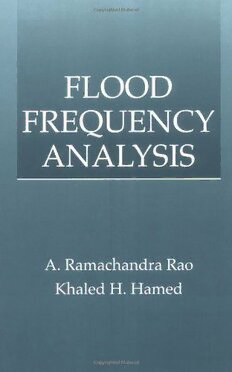Download Flood Frequency Analysis (New Directions in Civil Engineering) PDF Free - Full Version
Download Flood Frequency Analysis (New Directions in Civil Engineering) by Khaled Hamed, A. Ramachandro. Rao in PDF format completely FREE. No registration required, no payment needed. Get instant access to this valuable resource on PDFdrive.to!
About Flood Frequency Analysis (New Directions in Civil Engineering)
After five decades, the field of Statistical Hydrology continues to evolve and remains a very active area of investigation. Researchers continue to examine various distributions, methods of estimation of parameters, and problems related to regionalization. However, much of this research appears in journals and reports and usually in a form not easily accessible to practitioners and students-producing a gap between research and practice.Flood Frequency Analysis fills this gap by presenting many of these distributions and estimation procedures in a unified format within a single, self-contained book. Focusing on distribution families popular within the hydrologic community, the authors discuss three parameter estimation methods for each distribution: the method of moments, the maximum likelihood method, and the method of probability weighted moments. They present the details behind the procedures to provide the basis for the computations, and they illustrate each procedure with real data. Most of the computations discussed have been programmed for use with personal computers, and executable versions of these programs are available on CD-ROM from the senior author.Only increased use of new methods and distributions can produce a consensus on their validity. With other books on the subject either limited in scope or seriously outdated, Flood Frequency Analysis provides the ideal vehicle for practicing hydrologists and engineers to explore and apply the latest methods and research results, and in doing so, contribute to the advancement of the field.
Detailed Information
| Author: | Khaled Hamed, A. Ramachandro. Rao |
|---|---|
| Publication Year: | 1999 |
| ISBN: | 9780849300837 |
| Pages: | 356 |
| Language: | English |
| File Size: | 2.058 |
| Format: | |
| Price: | FREE |
Safe & Secure Download - No registration required
Why Choose PDFdrive for Your Free Flood Frequency Analysis (New Directions in Civil Engineering) Download?
- 100% Free: No hidden fees or subscriptions required for one book every day.
- No Registration: Immediate access is available without creating accounts for one book every day.
- Safe and Secure: Clean downloads without malware or viruses
- Multiple Formats: PDF, MOBI, Mpub,... optimized for all devices
- Educational Resource: Supporting knowledge sharing and learning
Frequently Asked Questions
Is it really free to download Flood Frequency Analysis (New Directions in Civil Engineering) PDF?
Yes, on https://PDFdrive.to you can download Flood Frequency Analysis (New Directions in Civil Engineering) by Khaled Hamed, A. Ramachandro. Rao completely free. We don't require any payment, subscription, or registration to access this PDF file. For 3 books every day.
How can I read Flood Frequency Analysis (New Directions in Civil Engineering) on my mobile device?
After downloading Flood Frequency Analysis (New Directions in Civil Engineering) PDF, you can open it with any PDF reader app on your phone or tablet. We recommend using Adobe Acrobat Reader, Apple Books, or Google Play Books for the best reading experience.
Is this the full version of Flood Frequency Analysis (New Directions in Civil Engineering)?
Yes, this is the complete PDF version of Flood Frequency Analysis (New Directions in Civil Engineering) by Khaled Hamed, A. Ramachandro. Rao. You will be able to read the entire content as in the printed version without missing any pages.
Is it legal to download Flood Frequency Analysis (New Directions in Civil Engineering) PDF for free?
https://PDFdrive.to provides links to free educational resources available online. We do not store any files on our servers. Please be aware of copyright laws in your country before downloading.
The materials shared are intended for research, educational, and personal use in accordance with fair use principles.

